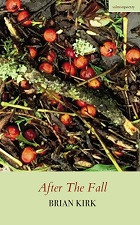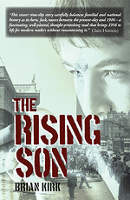
Interesting article in the Telegraph regarding the recent publication of a long lost Kerouac novel. Pity about the two basic errors in the short piece, but leaving that aside I was prompted to think about Kerouac for the first time in a long long time.
When I was in my late teens Kerouac was the writer for me. I read everything I could lay my hands on by him at the time and was heavily influenced (not always in a good way) by the way he approached prose writing. I was mainly writing poetry at the time, and in much the same way that punk rock encouraged anyone and everyone to write songs, so did Kerouac’s novels encourage me to try to write a novel at the age of twenty. I still have it somewhere and haven’t looked at it in years. I was blatantly using his novella The Subterraneans as the model for my effort, but I was also guided by the peculiar precept that it had to be true. Kerouac claimed that everything that happened in his books actually did really happen to him, and a lot of it can be verified by third parties. But is it fiction then? And just because it’s technically true does it mean it’s a better story?
At the time I was caught up in the idealism, honesty and freedom of the writing. I didn’t really consider things like character or story or premise simply because I had never heard them discussed. I loved the way he told a story, as if you were one of his buddies and he was filling you in over a few beers. I thought that if I could lead an interesting enough life I could maybe be a great writer. That’s youth for you.
Kerouac had issues also, as they say. He remained a committed Catholic throughout his life despite the drugs and the drink and the bohemian lifestyle. And he also had a mother who outlived him; a mother who appears at the edges of his peripheral vision in most of the books; she is a safe harbour at the end of each wild trip on the road. He comes across as a little lost boy sometimes, wanting to feel safe, to escape the same crazy world he helped quicken into life.
In his last book Vanity of Duluoz, a kind of summing up of his early years and how things have changed, published the year before he died in 1969, he tries to find a place for himself in an America he no longer recognises. He was never going to be the darling of the hippies the way Ginsberg was. He was way too conservative, too Catholic.
This from the man who only fifteen years earlier placed the automobile at the centre of the world’s understanding of modern America:
“Nowadays, tell me, what is this slouching stroll people have? Is it because they’re used to walking across parking-lots only? Has the automobile filled them with such vanity that they walk like a bunch of lounging hoodlums to no destination in particular?
Autumn nights in Massachusetts before the war you’d always see a guy going home for supper with his fists buried deep in the sidepockets of his jacket, whistling and striding along in his own thoughts, not even looking at anybody else on the sidewalk and after supper you’d always see the same guy rushing out the same way, headed for the corner candy store or to see Joe, or to a movie or to a poolroom or the deadman’s shift in the mills or to see his girl. You no longer see this in America, not only because everybody drives a car and goes with stupid erect head guiding the idiot machine through the pitfalls and penalties of traffic, but because nowadays no one walks with unconcern, head down, whistling; everybody looks at everybody else on the sidewalk with guilt and worse than that, curiosity and faked concern, in some cases ‘hip’ regard based on ‘Don’t miss a thing’, while in those days there even used to be movies of Wallace Beery turning over in bed on a rainy morning and saying: ‘Aw gee, I’m going back to sleep, I aint gonna miss anything anyway.’ And he never missed a thing.”
We all get older and we change. Sometimes we’re embarrassed when we think about some of the things we did or wrote when we were young, but we shouldn’t be. It’s what’s made us what we are today, like it or not. I have a lot to thank Jack for I know. I’ll leave you with that famous clip of him reading on the Steve Allen show – I bought a copy of this on tape in Camden Market in 1986. I still have it somewhere, hidden away with that draft novel by a 20 year old I hardly recognise anymore.
http://www.youtube.com/watch?v=QzCF6hgEfto



Interesting post, Brian. I’m afraid I gave up on Kerouac too. My favourite writer as a tongue-tied teenager was Dorothy Parker. I probably imagined myself writing sparklingly witty stories!
You do write sparklingly witty stories Valerie – but maybe not in the style of Dorothy Parker! Thanks for dropping by.
Really enjoyed this post because it is so personal and dare I say it – confessional in tone. A writer’s influences are always fascinating. I tried to read On the Road when I was in my twenties but I couldn’t settle into it. I don’t know why. I’m trying to think who I loved to read when I was a teenager and drawing a blank!
I didn’t expect to write that kind of post David, just reacted to the Telegraph article when I saw it. It’s funny how stuff stays with you over the years – I may even try to read one of his books again!